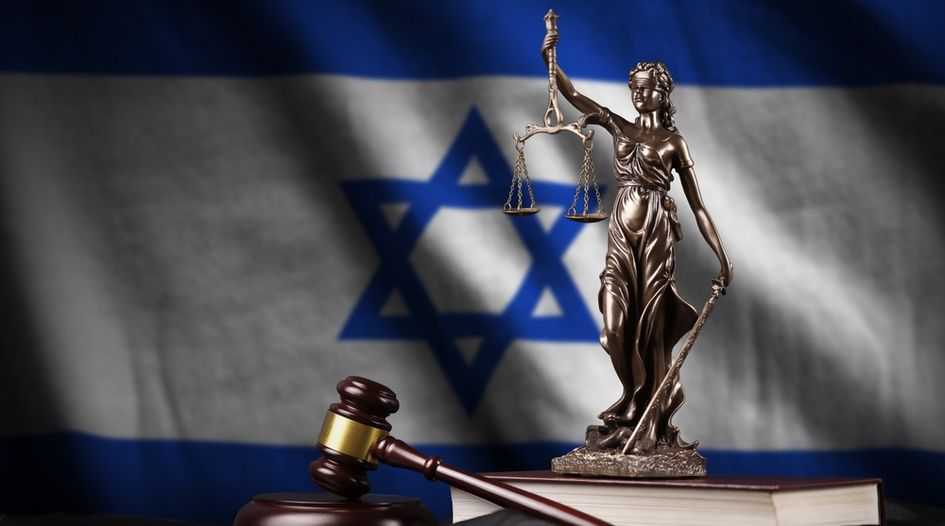Israel: A Deep Dive into National Prosecution Processes

This is an Insight article, written by a selected partner as part of IAM's co-published content. Read more on Insight
In summary
This article provides an overview of patents in Israel, including requirements of patent applications and responses to them, examination of patents and enforcement of patents.
Discussion points
- Details of the patent application process Oppositions and re-examinations
- Invalidation and inter partes reviews
- The examination process
- Patent enforcement
Referenced in this article
- Patents Law 5727-1976
- Patent Examination Working Guidelines
Five key ‘need to knows’
- Expedited examination is available in Israel.
- Section 18 of the Israeli Patents Law imposes certain disclosure requirements on applicants of patent applications.
- The Israeli Patents Law has limited grace period provisions, which exempt certain publications from the state of the art.
- Claims identity between two different applications is not accepted.
- A maximum of 50 claims are permitted under a basic filing fee.
In Israel, patents are governed by the Patents Law 5727-1976, as well as by various regulations relating to patents.
Eligibility
In Israel it is only possible to obtain a Utility Patent. The Patents Law provides that almost any invention, whether a product or a process, in any field of technology is patentable if it:
- is new and useful;
- has industrial application; and
- involves an inventive step.
However, procedures for therapeutic treatment on the human body are excluded by the Patents Law, as are new varieties of plants or animals, except microbiological organisms not derived from nature.
In addition, discoveries, scientific theories, mathematical formulae, rules for playing games and mental acts are considered as abstract ideas or processes that are devoid of technical characters. Notwithstanding this, such ideas or processes may be combined with additional technological means to result in products or processes in technological fields that are eligible for patent protection.
Examination trends
Israel is an international search and examination authority. As well as Israeli entities, US and Georgian applicants may also use the Patent Office as an international search and examination authority.
The Patent Examination Working Guidelines are updated periodically and include strict guidelines relating to the examination of, among other things, antibodies, polymorphs, overlap, novelty of the target population and computer-related inventions. The guidelines (including English translation) can be found at https://www.gov.il/he/Departments/DynamicCollectors/work-procedure-db?skip=0.
Israeli examination tends to give weight to examination results in other jurisdictions. As a result, the use of procedures that allow examination or allowance to be expedited on the basis of results in another jurisdiction should be considered before initiating a substantive examination.
Section 13(a) of the Patents Law is strictly interpreted and actual support in working examples is generally required. Section 13(a) reads: ‘The specifications shall end with a claim or claims that define the invention, on condition that each said claim reasonably arise out of the subject described in the specification.’
With respect to AI, the nature of future examination is unclear. While the Commissioner has decided that an AI cannot be a named inventor, their decision verbally excluded any discussion of the amount of human contribution to an invention that can render an AI-assisted development an eligible ‘invention’.
An examiner’s decision may be appealed to the Registrar of Patents. Decisions by the Patent Office, meanwhile, may be appealed to the court by the applicant or by a third party, if one is involved.
Handling of oppositions and re-examinations
In Israel there is a pre-grant opposition procedure. With regard to oppositions, the Patent Law provides that any person may oppose the grant of the patent within three months of the date on which the acceptance of the application is published. To do this they must file a written notice (with prescribed fees) to the Registrar of Patents. The grounds for opposition can include any one of the following:
- there is a reason for which the registrar had the authority to refuse to accept the patent application;
- the invention is not novel under section 4(2); or
- the opponent and not the applicant is the owner of the invention.
A re-examination may be requested by the applicant after a Notification Prior to Allowance has been issued if new prior art comes up. The request to re-open examination must be filed before the publication of allowance. Re-examination may also occur if the applicant asks to amend the allowed application or granted patent on its own initiative (for clarification, to remove obvious errors or to restrict the claims), either following an opposition against the published application, or following an application for revocation of the granted patent filed by a third party.
Invalidation and inter partes reviews
A patentee may request the cancellation of a patent in their name. If this is granted, a third party may oppose the cancellation. Any person other than the patentee may apply to revoke or cancel a patent. Inter partes proceedings can last several years.
Patent-term extensions
A patent for a pharmaceutical product or a medical device that requires marketing authorisation may be eligible for term extension if it includes claims directed to any of the following:
- a pharmaceutical product;
- the process for manufacturing such a product;
- the use of such a product;
- a pharmaceutical preparation containing such a product;
- a manufacturing process for pharmaceutical preparation containing such a product; or
- a medical device that requires marketing authorisation in Israel.
It is important to note that strict deadlines apply from the date that regulatory approval is obtained.
Pendency levels for the last 12 months
According to the Annual Report of the Israeli Patent Office of 2022, the average time from the filing of an application until the end of examination is 39.5 months (compared to 41.8 in 2021). Different technological fields average different amounts of time, with examination of applications in biotechnology being the longest (on average 44.4 months from filing of the application) and mechanics, electronics and physics being the shortest (on average 37.2 months from the filing of the application).
Expedited examination
There are five different ways by which to achieve an expedited examination in Israel.
The first is to seek acceleration under section 19A of the Patents Law. Under this section, a petition for accelerated examination may be filed at the Patent Office on the following grounds:
- likelihood of infringement;
- advanced age or poor medical condition of the applicant;
- public interest;
- or unreasonably long delay in initiating examination by the IPO.
If the registrar is satisfied that the petition is well grounded, examination will commence as soon as possible, subject to payment of the prescribed fee. Accelerated examination is available for applications that were first filed in Israel. These provide a search report and a preliminary opinion on patentability well within 12 months of filing.
The second way to achieve an expedited examination in Israel is through filing a request for an accelerated examination under the Global Patent Prosecution highway programme with the Patent Office before substantive examination commences.
Third, applicants may also apply for preferential status for applications that relate to ‘green’ technologies such as preventing global warming, decreasing the contamination of air or water, and the like.
Fourth, modified examination may be granted under section 17(c) of the Law, on the basis of a corresponding patent having been granted in one of the following jurisdictions: Australia, Austria, Canada, Denmark, European Patent Office, Germany, Japan, Norway, the Russian Federation, Sweden, the United Kingdom and the United States.
According to the Annual Report of the Israeli Patent Office of 2022, the percent of applications granted under section 17(c) of the Law was 19.3 per cent (with similar percentages in preceding years).
Finally, applicants may accelerate examination by filing a response to the International Search Report/Written Opinion or to the Preliminary Examination Report, as long as this is done before the standard official Notification Prior to Examination is issued.
Duty of disclosure
Section 18 of the Patents Law imposes certain disclosure requirements on applicants. Prior to examination, the Patent Office will direct the applicant’s attention to the need to submit information under section 18. This requirement is ongoing up to allowance of the application. The applicant is required to inform the office of any new references that are or have been cited (whether by patent offices or during various proceedings, such as oppositions, patent nullifications and other court proceedings) or that have surfaced in any other way, which may be of relevance in examining the issue of patentability. Great diligence is required in complying with this duty of disclosure requirements. Failure to disclose can be detrimental to the validity of a granted patent.
Grace period
The Patents Law includes limited grace period provisions, which exempt certain publications from the state of the art. These include unlawful publication by a third party (section 6(1)) and, subject to prior notification to the Commissioner, display at a recognised exhibition (Section 6(2)) or publication by way of a lecture before a scientific society and also publication of proceedings of such scientific meeting (section 6(3)).
Overlap
Claims identity between two different applications is not accepted. For different applications filed by the same applicant on the same date, such as a parent and a divisional application, for example, partial overlapping between claims is accepted (eg, when the scope of protection in claims of the divisional application includes or is included in the scope of the claims of the parent application). No claim overlap, even partial, is permitted for different applications filed on the same date by different applicants. Further details may be found in Appendix 5 of the Examination Guidelines.
Additional fees
The basic filing fee permits a maximum of 50 claims within an application. Any additional claim will attract an extra fee of 560 shekels. Furthermore, the basic fee permits a maximum of 100 description pages, excluding sequence listing pages. Every additional 50 pages will attract an extra fee of 273 shekels. A Small Entity Discount of 40 per cent on the official filing and acceptance fees is available to individuals and companies or partnerships with a turnover of less than 10 million shekels in the preceding year. This discount is not available for the national phase of a PCT application or for patent applications filed under the Paris Convention.
Specific requirements
At a minimum, an application must include:
- a specification including title by which the invention can be defined;
- a description of the invention, with any drawings that may be necessary; and
- a description of how the invention can be used.
The patent specification must end with a claim or claims that define the invention, provided that each claim is supported by the description.
The patent specification can be filed in in Hebrew, Arabic or English, although if it is filed in Arabic, the IPO will require a translation. Additional documents such as power of attorney, copy of priority document, translation and so on can be completed after filing.
Israel is a signatory to the Budapest Treaty. When an invention includes biological material that is not available to the public or it involves the use of a biological material that has been deposited in a deposit institute, reference to the deposit details must be included.
Where amino acid and/or nucleic acid sequences are recited in the specification, a list of the sequences should be submitted in a computer readable form (.txt file). As of 1 July 2022, WIPO ST/26 is applied.
Divisional patent applications
The Patents Law allows for the filing of divisional patent applications. As long as the application has not already been accepted, the applicant is entitled to request that it be divided into one or more applications. Similarly, if the application includes more than one invention, then the registrar may direct the applicant to divide the application, as long as the application has not yet been accepted. Divisional applications can be further divided out of a pending divisional application before its acceptance. The date of each divisional patent application shall be the same as that of the application from which it was divided and it will enjoy same priority claim or claims.
There are no continuations or continuation-in-part applications in Israel.
Patent of addition
If a patent holder is the owner of an invention which improves or modifies an invention for which a patent has already been granted, then they may request that a patent for the second invention be granted to them as a patent of addition. This patent does not need to involve an inventive step beyond the original patent. The patent of addition is effective for as long as the original patent is, and there is no need to pay any renewal fee with respect to the patent of addition on top of the fees paid for the original patent.
Office actions and patent examiner interviews
A response to an Official Notification should be filed within four months of its date of issue. Applicants are entitled to request an extension of up to four months for each round of examination. The total length of extension available for the entire process of examination is limited to 12 months.
It is possible to conduct an interview with the examiner. In this interview it is possible to discuss various aspects of the invention, its defects and possible corrections to overcome those defects. Interviews are scheduled directly with the examiner and should be accompanied by a written notification of the interview initiative, including details of the issues to be discussed. It should be noted that a request for an interview does not replace the duty to respond to a pending official notification.
If an examiner decides that examination has reached a dead end (usually but not always after two examination reports have been issued), a notification before formal refusal is issued. It is common and recommended to request an interview with the examiner when responding. There is no utility model or petty patent protection in Israel.
Administrative enforcement of patents
The Israel Patents Law deals with the state’s right to exploit inventions. Section 104 prescribes that a Minister may permit the exploitation of an invention by government departments or by an enterprise or agency of the state, whether or not a patent for it has already been granted or applied for, if they find it necessary in the interests of national security or to the maintenance of essential supplies and services.
Furthermore, section 105 prescribes that the Minister may, if they find it necessary for the purposes enumerated in section 104, grant a permit under that section to a person who operates under contract with the state, in order to ensure or facilitate the implementation of that contract and for the requirements of the state only.
On 18 March 2020, for example, the Minister of Health issued a permit to the state to exploit an invention pursuant to these sections of the Law to import Kaletra (lopinavir 200mg/ritonavir 50mg) for the sole purpose of treating covid-19 patients. This authorisation was the first time that sections 104 and 105 of the Patents Law had been invoked for public non-commercial use.

